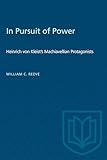In Pursuit of Power : Heinrich von Kleist's Machiavellian Protagonists / William C. Reeve.
Material type: TextSeries: HeritagePublisher: Toronto : University of Toronto Press, [1987]Copyright date: ©1987Description: 1 online resource (248 p.)Content type:
TextSeries: HeritagePublisher: Toronto : University of Toronto Press, [1987]Copyright date: ©1987Description: 1 online resource (248 p.)Content type: - 9781487585198
- 9781487575236
- 832.6 23
- online - DeGruyter
| Item type | Current library | Call number | URL | Status | Notes | Barcode | |
|---|---|---|---|---|---|---|---|
 eBook
eBook
|
Biblioteca "Angelicum" Pont. Univ. S.Tommaso d'Aquino Nuvola online | online - DeGruyter (Browse shelf(Opens below)) | Online access | Not for loan (Accesso limitato) | Accesso per gli utenti autorizzati / Access for authorized users | (dgr)9781487575236 |
Browsing Biblioteca "Angelicum" Pont. Univ. S.Tommaso d'Aquino shelves, Shelving location: Nuvola online Close shelf browser (Hides shelf browser)

|

|

|

|

|

|

|
||
| online - DeGruyter The Rising in Western Upper Canada 1837-8 : The Duncombe Revolt and After / | online - DeGruyter Diefenbaker's World : A Populist in Foreign Affairs / | online - DeGruyter Post-War Immigrants in Canada / | online - DeGruyter In Pursuit of Power : Heinrich von Kleist's Machiavellian Protagonists / | online - DeGruyter The Old World and the New : Literary Perspectives of German-speaking Canadians / | online - DeGruyter Women's Suffrage and Party Politics in Britain, 1866-1914 / | online - DeGruyter The Ombudsman : Citizens Defender / |
restricted access online access with authorization star
http://purl.org/coar/access_right/c_16ec
A number of striking parallels link the lives and careers of Machiavelli and Kleist. This study of the influence of one on the work of the other begins with an outline of those parallels, and of the Machiavellian atmosphere in Kleist's first play, Die Familie Schroffenstein. Reeve goes on to focus on the protagonists of Kleist's plays, beginning with Licht in Der zerbrocheme Krug. He exposes the skill of Licht's behind-the-scenes direction of the course of events to his own advantage and to the detriment of his superior, Adam. Next Reeve offers a detailed analysis of Die Hermannsschlacht, in which he demonstrates how Hermann embodies those qualities - the cunning of the fox and the strength of the lion - demanded by Machiavelli in a successful ruler. With these traits Hermann has brought the German princes, his own tribe, his rival Marbod, his wife, and even the Romans to a point where, unwittingly, the have all worked towards the establishment of a united Germany under his leadership. The chapter n Prinz Friedrich von Homburg singles out the underhand manoeuvers of the sadistic Hohenzolern who plots to embarrass publicly both the Elector and the Prince as a subtle manifestation of his personal power over the two leading contenders for political supremacy. The fragment Robert Guiskard contains two Machiavellian protagonists, an older more accomplished practitioner and an up-and-coming young threat, and treats another issue addressed in Il Principe: what occurs when an ideal leader at the height of his powers is cut down by a disabling illness? Indicative of the beginning and the end of Kleist's opus, half of his plays contain the figure of the clandestine schemer who plans the social or political elimination of a rival and, by stealth and skillful manipulation of others, directs the course of events at almost every turn. Reeve concludes with an attempt to explain the presence of the Machiavellian in Kleist's works as the indirect influence of Shakespeare's three villains, the direct example of Napoleon, or the dramatist's own independent insight into the less admirable aspects of the human mind.
Mode of access: Internet via World Wide Web.
In English.
Description based on online resource; title from PDF title page (publisher's Web site, viewed 01. Nov 2023)


